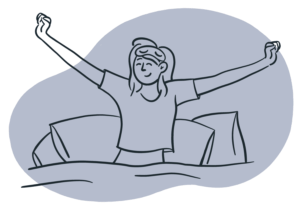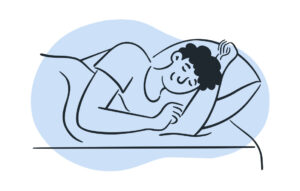How Much Sleep Do You Need?
Disclosure: By clicking on the product links in this article, Mattress Nerd may receive a commission fee at no cost to you, the reader. Read full disclosure statement.
If you’ve ever gone a night without sleep, you know how much “sleep debt” — the effect of not getting enough sleep at night — can hurt. In today’s fast-paced society, do you remember what it’s really like to feel rested? If someone asked how many hours of sleep a night you need in order to be healthy, what would you say? Most people would probably say somewhere in the 7-9 hour range. But, believe it or not, the answer isn’t all that straightforward.
After an extensive review of research, experts at the National Sleep Foundation have weighed in with recent updates to their sleep time recommendations. For healthy adults, the amount of sleep you need will vary based on a number of factors. So, to determine how many hours of sleep you need, here are a few things to consider.
Age
Age is a good starting point to pinpoint your baseline sleep needs. That seven to nine hour guideline that most people know comes from the American Academy of Sleep Medicine. However, the National Sleep Foundation’s updates include a number of changes:
- Newborns (0-3 months): Sleep range narrowed to 14-17 hours each day (previously 12-18)
- Infants (4-11 months): Sleep range widened two hours to 12-15 hours (previously 14-15)
- Toddlers (1-2 years): Sleep range widened by one hour to 11-14 hours (previously 12-14)
- Preschoolers (3-5 years): Sleep range widened by one hour to 10-13 hours (previously 11-13)
- School age children (6-13 years): Sleep range widened by one hour to 9-11 hours (previously 10-11)
- Teenagers (14-17 years): Sleep range widened by one hour to 8-10 hours (previously 8.5-9.5)
- Younger adults (18-25 years): Sleep range is 7-9 hours (new age category)
- Adults (26-64): Sleep range did not change and remains 7-9 hours
- Older adults (65+): Sleep range is 7-8 hours (new age category)
You might be able to stop there; those guidelines should be good for most individuals. But, if you’re waking up tired, there are a few other things to consider.
Related: Best Mattresses for Kids
Quality of Sleep
The overall quality of your sleep may impact your sleep needs. But how do you know if you’re actually getting good sleep? Here are a few questions to clue you in:
- How long does it take you to fall asleep? Do you fall asleep in five minutes or less? Or, on the flip side, does it take you more than thirty minutes to fall asleep?
- What’s your relationship with the alarm clock? Do you need one in order to wake up on time? Do you find yourself hitting snooze regularly?
- Do you have a hard time getting out of bed in the morning?
- Do you feel drowsy in the afternoon, in warm rooms, during meetings, while driving, or while watching TV?
- Do you feel the need to nap or drink caffeine regularly just to get through the day?
- Do you feel like you have to sleep in on weekends to “catch up” on sleep?
A ‘yes’ on one or more of those questions could indicate that your sleep needs aren’t being met, and there are a number of possible causes. For example, sleep schedule can certainly play a role in sleep quality. Circadian rhythms, or your body’s natural sleep cycles, can be tough to fight. And an irregular sleep schedule can really knock them out of sync. If you’re not on a consistent sleep schedule, or if it frequently changes, you might not be getting good quality sleep. So, even if you hit the ‘right’ number of hours, those hours are less effective at filling your body’s needs. Like with most things, quality over quantity is key when it comes to restful sleep.
Health Issues
Sleep disorders are an obvious place to start when you consider health issues. Sleep apnea is one of the most common and well-known sleep disorders, and is associated with other health issues such as obesity, diabetes, and heart disease. So, if any of those conditions apply, it might be a good idea to see a sleep medicine specialist to assess for sleep apnea and other sleep disorders.
These clues and guidelines should help you determine how much sleep you need. But, if you’re ever in doubt, talking to your doctor is always a good place to start. Sleep is not “one-size-fits-all.” And, if you do seem to need more — or less — than other people, you’re not alone. Sleep is a crucial part of your overall physical and mental health, so if you think you aren’t getting enough, it might be time to prioritize finding a good sleep routine to ensure you’re getting the right amount, and quality, of sleep for your individual needs.


